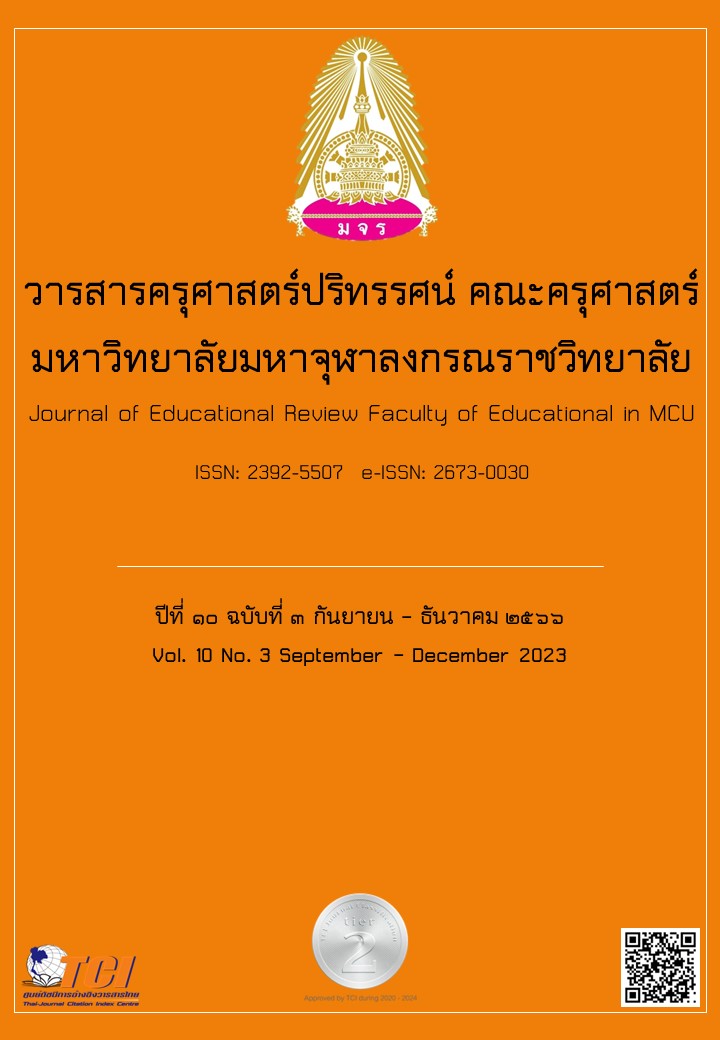GUIDELINES FOR LEADERSHIP DEVELOPMENT IN THE NEW NORMAL ACCOEDING TO THE TEN ROYAL VIRTUES OF PRIMARY SCHOOL ADMINISTRATORS UNDER THE OFFICE OF SARABURI PRIMARY EDUCATIONAL SERVICE AREA 1
Main Article Content
Abstract
The objectives of this research are: 1) to study the current state of leadership in the New Normal of primary school administrators, 2) to study methods for leadership development in the New Normal of primary school administrators according to the Ten Royal Virtues, and 3) to propose guidelines of leadership development methods according to the Ten Royal Virtues for primary school administrators under the Office of Saraburi Primary Educational Service Area 1. The mixed research methods were used in the study. The data were collected by questionnaires from 132 samples and by interviews with 5 experts. The data were analyzed by percentage, mean, standard deviation and content analysis. The study results that; 1) The current state of leadership in the New Normal of primary school administrators under the Office of Saraburi Primary Educational Service Area 1 was at a high level overall, 2) The methods for leadership development in the New Normal of primary school administrators according to the Ten Royal Virtues were in a high level, (1) Leadership achievement, (2) Leadership in communication, (3) Competency of leadership, and (4) Human relations of leadership, 3) The guidelines of leadership development methods according to the Ten Royal Virtues for primary school administrators under the Office of Saraburi Primary Educational Service Area 1 is an integration of the Ten Royal Virtues in leadership development, which is to create a working atmosphere, teamwork, accept the difference, encourage teachers to take initiative to develop all-round knowledge, adhere to correctness and fairness. It is making school administration more efficient.
Article Details

This work is licensed under a Creative Commons Attribution-NonCommercial-NoDerivatives 4.0 International License.
ทัศนะและความคิดเห็นที่ปรากฏในบทความในวารสารฉบับนี้ถือเป็นความรับผิดชอบของผู้เขียนบทความนั้นเพียงผู้เดียว และไม่ถือเป็นทัศนะและความรับผิดชอบของกองบรรณาธิการ
กองบรรณาธิการขอสงวนสิทธิ์ในการคัดเลือกบทความลงตีพิมพ์และจะแจ้งให้เจ้าของบทความทราบหลังจากผู้ประเมินบทความตรวจอ่านบทความแล้ว
ต้นฉบับที่ได้รับการตีพิมพ์ในวารสารครุศาสตร์ปริทรรศน์ คณะครุศาสตร์ มหาวิทยาลัยมหาจุฬาลงกรณราชวิทยาลัย ถือเป็นกรรมสิทธิ์ของคณะครุศาสตร์ มหาวิทยาลัยมหาจุฬาลงกรณราชวิทยาลัย ห้ามนำข้อความทั้งหมดหรือบางส่วนไปพิมพ์ซ้ำ เว้นเสียแต่ว่าจะได้รับอนุญาตจากมหาวิทยาลัยฯ เป็นลายลักษณ์อักษร
References
ช่วงโชติ พันธุเวช. (2552). การจัดการคุณภาพ. พิมพ์ครั้งที่ 3. กรุงเทพมหานคร: มหาวิทยาลัยราชภัฏสวนสุนันทา.
ธร สุนทรายุทธ. (2551). การบริหารจัดการเชิงปฏิรูป: ทฤษฎีวิจัยและปฏิบัติทางการศึกษา. กรุงเทพมหานคร: เนติกุลการพิมพ์.
ประธาน ยศรุ่งเรือง. (2559). แนวทางการพัฒนาภาวะผู้นำของผู้บริหารสถานศึกษา สังกัดสำนักงานเขตพื้นที่การศึกษาประถมศึกษาเพชรบูรณ์ เขต 3. วิทยานิพนธ์การศึกษามหาบัณฑิต. มหาวิทยาลัยราชภัฏนครสวรรค์.
พระครูภัทรธรรมคุณ. (2554). การศึกษาภาวะผู้นำของผู้บริหารการศึกษาตามหลักพรหมวิหาร 4 โรงเรียนมัธยมศึกษาในอำเภอพัฒนานิคม จังหวัดลพบุรี. วิทยานิพนธ์พุทธศาสตรมหาบัณฑิต. มหาวิทยาลัยมหาจุฬาลงกรณราชวิทยาลัย.
พระเทพปริยัติเมธี. (2553). ภาวะผู้นําเชิงพุทธกับการจัดการความขัดแย้งในสังคมไทย. รายงานการวิจัย. สถาบันวิจัยพุทธศาสตร์. มหาวิทยาลัยมหาจุฬาลงกรณราชวิทยาลัย.
พระพรหมคุณาภรณ์ (ป. อ. ปยุตฺโต). (2546). ภาวะผู้นำ. พิมพ์ครั้งที่ 7. กรุงเทพมหานคร: สำนักพิมพ์สุขภาพใจ.
ภควรรณ ลุนสำโรง. (2560). การพัฒนารูปแบบภาวะผู้นำเชิงสร้างสรรค์ของผู้บริหารสถานศึกษาขั้นพื้นฐาน สังกัดสำนักงานเขตพื้นที่การศึกษาประถมนครราชสีมา. ดุษฎีนิพนธ์ครุศาสตรดุษฎีบัณฑิต. มหาวิทยาลัยนอร์ทกรุงเทพ.
ภูษณิศา วรสายัณห์. (2563). แนวทางการพัฒนาภาวะผู้นำยุคดิจิทัลตามหลักภาวนา 4 ของผู้บริหารโรงเรียนขยายโอกาสทางการศึกษา สำนักงานเขตพื้นที่การศึกษาประถมศึกษาชลบุรี เขต 2. วิทยานิพนธ์ครุศาสตรมหาบัณฑิต. มหาวิทยาลัยมหาจุฬาลงกรณราชวิทยาลัย.
อรสา มาสิงห์. (2560). การพัฒนาทักษะภาวะผู้นําในศตวรรษที่ 21 ของผู้บริหารสถานศึกษาสังกัด สำนักงานเขตพื้นที่การศึกษาประถมศึกษานครราชสีมา. ดุษฎีนิพนธ์ครุศาสตรดุษฎีบัณฑิต. มหาวิทยาลัยราชภัฏนครราชสีมา.
Krejcie, R. V. & Morgan, D. W. (1970). Determining Sample Size for Research Activities. Educational and Psychological Measurement. 30(3). 607-610.
Krumam. (2553). ทฤษฎีภาวะผู้นำ (Leadership Theories). แหล่งที่มา https://www.gotoknow.org/ posts/376994 สืบค้นเมื่อ 8 ส.ค. 2565.


